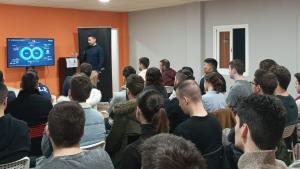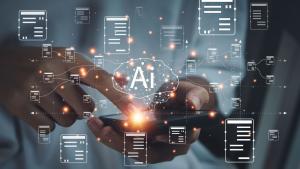The Transformative Impact of Generative AI: Lessons and Opportunities - Asset Display Page

The Transformative Impact of Generative AI: Lessons and Opportunities

The Transformative Impact of Generative AI: Lessons and Opportunities
September 24, 2024
Generative Artificial Intelligence (GenAI) has undoubtedly been one of the most disruptive technological advances of recent times, comparable to the arrival of the Internet. One year after the boom of this technology, we have learned valuable lessons about its impact and potential.
Increased investment in generative AI
The year 2023 witnessed significant growth in investment in Artificial Intelligence. According to Statista, AI market value is estimated to exceed $320 billion by 2026. Specifically, Generative AI reached $25.2 billion in investment that same year, according to data from the 2024 AI Index report, reflecting its transformative potential. Meanwhile, a KPMG survey also revealed that 74% of business leaders consider GenAI to be one of the most impactful emerging technologies for the next 12 to 18 months, primarily affecting the IT and Technology, Operations, as well as Marketing and Sales sectors. These data underscore the rapid business adaptation and enthusiasm towards these technologies, driven by their benefits in process optimization, automation and increased efficiency.
Lessons learned from the GenAI “Boom”
A year ago, we witnessed a significant leap in Generative AI technology, marking a milestone in the way machines learn and create content – a capability that was once exclusive to humans. From art and music, to text and code generation for programming, Generative AI is transforming and driving new forms of creativity and redefining the technological landscape.
In retrospect, it is vital to recognize the lessons we have learned during this period of change and understand how these can guide our future. However, we must also consider the ethical implications of this evolution. The increasing integration of advanced language models and other forms of Generative AI into our lives raises concerns in terms of cybersecurity, intellectual property and legal challenges that must be managed responsibly.
With all of this in mind, what are some of the lessons we have learned from the explosion of GenAI over the past year?
Without a doubt, one of the most important is that ethics are nonnegotiable. The ability to generate fake or manipulated content has raised serious concerns, underscoring the need to create responsible and secure systems that include mechanisms to detect and mitigate misuse. In addition, transparency is crucial for users to understand how algorithms work, how they are trained, and what their limitations are, allowing them to make informed decisions. We have also learned that interdisciplinary collaboration is key, bringing together experts in technology, ethics, law, and design to ensure beneficial and equitable applications.
In addition, education and training are essential, not only in technical skills, but also in empowering human ingenuity and creativity. Preparing for the labor impact of GenAI is vital, as it will transform or create new roles and it is necessary to invest in the professional development of talents.
GenAI is already changing the work landscape within organizations, automating some activities, while other jobs will need to be transformed, or new roles will emerge. Organizations must prepare their employees for these changes by redefining their tasks and investing in professional development. In this regard, according to the World Economic Forum, by 2025, AI will create 97 million new roles in sectors ranging from software development to personalized healthcare. Similarly, sustainability must be a key focus in the development of technology, driving investment in centers of excellence that maximize its benefit for both humanity and the planet.
Within this context, an emphasis on cybersecurity has become crucial, as AI and automation can not only generate significant savings, they can also be used to ensure information security and prevent vulnerabilities. As Generative AI is integrated into more systems, interoperability becomes increasingly relevant, with the adoption of open standards serving as a way to facilitate this integration and improve overall functionality. In addition, human oversight remains indispensable in critical areas such as medicine or law, making it is essential to stay up to date with AI regulations to ensure safe and ethical use of this technology.
Spain and Europe lead the way in the development of Generative AI
Across Europe, the growing importance given to regulating the use of AI is notable. The region has taken a proactive approach to the development and regulation of AI, as demonstrated by the Coordinated Plan on Artificial Intelligence and the European Union Artificial Intelligence Act, significant efforts to promote the ethical and safe use of AI.
Particularly notable is that Spain launched the National Strategy for Artificial Intelligence, allocating investments of more than 600 million euros through 2025. In addition, the country has promoted the creation of AI centers of excellence and has been a pioneer in the development of a Digital Rights Charter that includes specific provisions to guarantee transparency, non-discrimination, and human control in AI systems.
While these efforts reflect the region's commitment to responsible technological advancement and preparation for a GenAI-driven future, there are still challenges to be addressed. These include the need to promote the training of professionals specialized in AI and GenAI, encouraging closer collaboration among the public, private, and academic sectors, and to advance the development of a solid legislative framework, among other crucial aspects.
Generative AI is a powerful force for innovation and economic growth. Addressing ethical and practical challenges while celebrating the new opportunities it generates will be key to a promising future. Harnessing the potential of GenAI while simultaneously protecting and valuing human qualities will allow this technology to not only transform industries, but to enrich the human experience in ways we are only just beginning to explore. By working together and applying these lessons, we can unlock the potential of GenAI to drive sustainable growth and progress in our organizations and society.
This article was published in the Spanish newspaper El Economista (The Economist).
Featured
Most viewed










